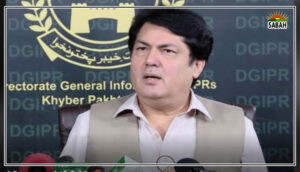Capital suggestion: Managing the IMF…Dr Farrukh Saleem
Cannot live without the IMF. With net reserves at the State Bank of Pakistan (SBP) standing at only $7.9 billion, upcoming payments in April, May, and June alone exceed $4 billion. With net reserves at the SBP standing at only $7.9 billion, gross external financial requirements over the following year are a staggering $25 billion. If we cannot live without the IMF, let us learn to live with it. Let us adapt to its presence. Let us endeavour to cultivate a more sustainable relationship with the IMF.
First and foremost, it’s crucial to recognize that our present economic vulnerabilities stem directly from our past policy errors. We must also acknowledge that previous IMF programmes (totaling 24) faced challenges in full implementation. Furthermore, we need to come to terms with the fact that proposed reforms frequently meet political opposition, leading to their stagnation. Heres what we need to do now:
Recognize the severity of our economic vulnerabilities: The Pakistani government consistently spends Rs8,500 billion more than it generates in revenue, perpetuating a cycle of borrowing. Additionally, the substantial disparity between imports and exports renders Pakistan dependent on foreign inflows to meet its financial obligations. The drain on government resources caused by subsidies and inefficiencies in the energy sector further exacerbates the situation, deterring investment. Moreover, Pakistan’s export sector faces formidable global competition, impeding overall economic growth.
A credible reform agenda: The Ministry of Energy must present the IMF with a comprehensive plan to improve efficiency and reduce circular debt in the power sector. The Ministry of Finance must focus on fiscal consolidation. The Ministry of Finance must develop a medium-term fiscal framework with clear targets for revenue generation and expenditure rationalization. Please prioritize social spending. To address inflation and uphold a competitive rupee, a well-coordinated monetary policy will be essential.
Demonstrate commitment to reform implementation: The Ministry of Finance must establish clear monitoring mechanisms to track progress on reforms and communicate results transparently to the IMF and the public. This will demonstrate commitment to achieving stated goals. In some cases, fast-track legislation will be required to implement agreed-upon reforms. This will demonstrate a proactive approach.
Flexibility and negotiation skills: The Ministry of Finance must negotiate from a position of strength by assembling a skilled team with expertise in economics, finance, and international negotiations. The Ministry of Finance must ensure that Pakistan presents well-researched arguments and effectively advocates for its interests.
Yes, the IMF is a necessary crutch for Pakistan’s current economic reality. But crutches, by their very design, are meant to be temporary. The Ministry of Finance must acknowledge past missteps and negotiate a program focused on long-term growth. The Ministry of Finance must use the IMF as a springboard. Don’t wait for the IMF to dictate reforms. Dont wait for the IMF to prescribe the cure.
The Ministry of Finance should demonstrably tackle vulnerabilities like high fiscal deficits with concrete plans. The Ministry of Finance must take on a proactive approach which would enable it to negotiate from a position of strength. The Ministry of Finance needs to ditch the patient act. No more limping to the table, but marching in with a clear vision for a thriving future.
Courtesy The News












